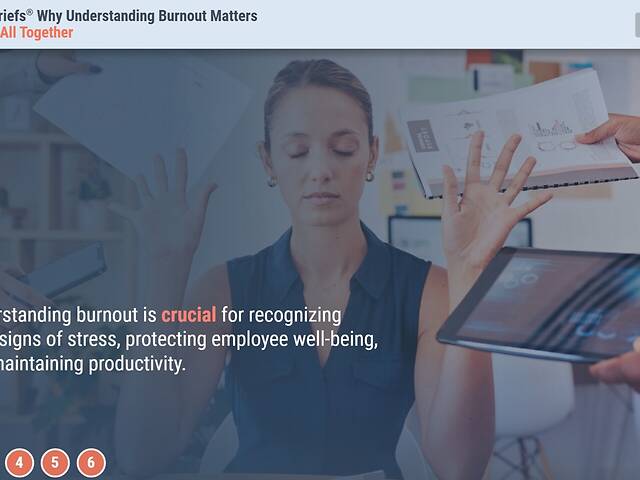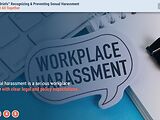
TrainingBriefs® Why Understanding Burnout Matters
8 Minutes Level: Foundational
Workplace burnout is a state of chronic physical, emotional, and mental exhaustion caused by prolonged and excessive work-related stress. It often results in feelings of overwhelm, cynicism, detachment from work, and a reduced sense of accomplishment or effectiveness. Understanding burnout and why it matters helps the organization and individuals recognize early warning signs, prevent serious health and performance issues, and create healthier, more sustainable work environments.
Target Audience: General
Language: English
0

Features
- Audio Narration
- Interactive Exercises
- Post-Assessment
Learning Objectives
Description
Workplace burnout is a state of chronic physical, emotional, and mental exhaustion caused by prolonged and excessive work-related stress. It often results in feelings of overwhelm, cynicism, detachment from work, and a reduced sense of accomplishment or effectiveness. Understanding burnout and why it matters helps the organization and individuals recognize early warning signs, prevent serious health and performance issues, and create healthier, more sustainable work environments.
If left unaddressed, burnout can lead to serious health problems, decreased productivity, and high employee turnover, including:
- Burnout reduces focus, creativity, and efficiency, leading to lower output.
- Exhaustion and disengagement often result in more mistakes and safety risks.
- Burned-out employees are more likely to take sick days or extended leaves.
- Chronic burnout drives employees to quit, raising recruitment and training costs.
- Burnout spreads negativity, lowering overall team spirit and engagement.
- It can lead to anxiety, depression, insomnia, heart disease, and other serious health issues.
- A workplace known for burnout may struggle to attract top talent and could face public backlash.
- Disengaged employees are less likely to provide quality service, affecting client satisfaction and loyalty.
- Burnout can fuel frustration and irritability, increasing tension and disputes among coworkers.
- Exhausted teams are less likely to generate fresh ideas or solve problems creatively.
Learning Topics
Industry Settings
- Healthcare
- Industrial & Manufacturing
- Office & General
- Retail
Compatibility Notes
- Supports iPhone & iPad App: TrainingFlow™ App on iOS devices
- Supports Android App: TrainingFlow™ app on Android devices
- Supports Current Browsers: Chrome 60+, Firefox 60+, Safari 12+, Edge 16+
Similar CoursesShow More | Topic | |
|---|---|---|
 | TrainingBriefs® Why Digital Transformation in Healthcare Matters | Communication |
 | TrainingBriefs® Why Customer Service in Healthcare Matters | Customer Service |
 | TrainingBriefs® Recognizing & Preventing Sexual Harassment | Sexual Harassment |
 | TrainingBriefs® When the Boss Calls a Meeting | Generational Challenges |
 | Conflict Clock™ for Managers & Supervisors | Conflict Resolution |
 | Got Ethics?® Use of Intellectual Property | Ethics |
 | TrainingBriefs® Why Understanding Workforce Planning Matters | Leadership |
 | TrainingBriefs® Why Understanding Compassionate Care Matters | Respect |
 | TrainingBriefs® Why a Continuous Learning Culture Matters | Personal Performance |
 | TrainingBriefs® Why Understanding Conscientious Refusal Matters | Inclusion & Equity |
